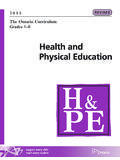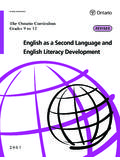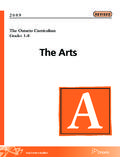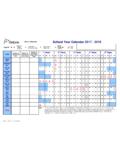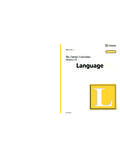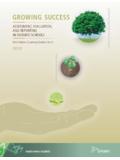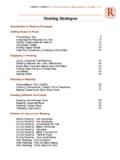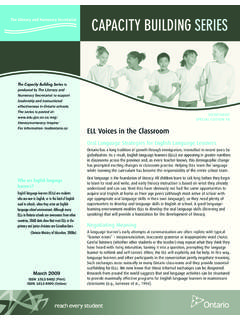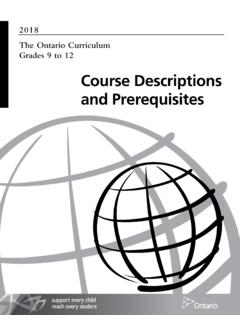Transcription of THE ONTARIO CURRICULUM, GRADES 11 AND 12 | …
1 cooperative EducationThe ONTARIO CurriculumGrades 11 and 122018 The ONTARIO Public Service endeavours to demonstrate leadership with respect to accessibility in ONTARIO . Our goal is to ensure that ONTARIO government services, products, and facilities are accessible to all our employees and to all members of the public we serve. This document, or the information that it contains, is available, on request, in alternative formats. Please forward all requests for alternative formats to ServiceOntario at 1-800-668-9938 (TTY: 1-800-268-7095).CONTENTSPREFACE 5 Secondary Schools for the Twenty-First Century.
2 5 Supporting Students Well-Being and Ability to Learn .. 5 The Role of Mental Health .. 7 THE IMPORTANCE OF cooperative education 8 Benefits and Goals of cooperative education .. 8 education and Career/Life Planning through the cooperative education Curriculum .. 9 Experiential Learning as the Foundation for cooperative education .. 10 Roles and Responsibilities in the cooperative education Program .. 11 Community Partners, Including Placement Employers and Supervisors .. 12 Students .. 12 Parents .. 13 Teachers .. 13 Principals .. 14 THE PROGRAM IN cooperative education 15 Overview of the Program .. 15 The Classroom Component.
3 16 The Community Component .. 16 Courses in cooperative education .. 17 Curriculum Expectations .. 18 Strands in the cooperative education Curriculum .. 21 Essential Processes for Learning in cooperative education .. 21 Ensuring Health, Safety, and Well-Being .. 21 Applying the Experiential Learning Cycle .. 23 Developing and Implementing the Student s cooperative education Learning Plan .. 24 Integrating Student Learning .. 26 Monitoring Student Progress .. 27 Assessing and Evaluating Student Learning .. 28 Une publication quivalente est disponible en fran ais sous le titre suivant : Le curriculum de l ONTARIO , 11e et 12e ann e ducation coop rative, 2018 This publication is available on the Ministry of education website, at AND IMPLEMENTATION OF THE cooperative education PROGRAM 30 Development and Implementation of Courses.
4 31 Stage 1: Planning the Opportunity .. 31 Stage 2: Preparing for the Opportunity .. 34 Stage 3: Supporting Student Learning and Well-Being .. 35 Administrative Considerations .. 36 Coverage under the Workplace Safety and Insurance Act, 1997 .. 36 Student Accident Insurance .. 38 Student Records .. 38 Confidentiality .. 38 Class Size .. 38 Allocation of Teachers and Timetabling .. 39 Student Remuneration .. 39 Community Connections in a Unionized Environment .. 39 Monitoring Program Implementation and Assessing the Impact of the cooperative education Program on Student Achievement .. 40 ASSESSMENT, EVALUATION, AND REPORTING OF STUDENT ACHIEVEMENT 42 Basic Considerations.
5 42 Fundamental Principles .. 42 Learning Skills and Work Habits .. 43 Content Standards and Performance Standards .. 43 Assessment for Learning and as Learning .. 44 Evaluation .. 45 Granting of Credits .. 46 Reporting Student Achievement .. 48 The Achievement Chart for cooperative education .. 49 Categories of Knowledge and Skills .. 49 Criteria and Descriptors .. 50 Levels of Achievement .. 51 SOME CONSIDERATIONS FOR PROGRAM PLANNING IN cooperative education 54 Planning cooperative education Programs for Students with Special education Needs .. 54 Students Requiring Accommodations Only .. 55 Students Requiring Modified Expectations.
6 56 Program Considerations for English Language Learners .. 57 Environmental education and cooperative education .. 60 Healthy Relationships and cooperative education .. 603 Equity and Inclusive education in the cooperative education Program .. 61 Financial Literacy in cooperative education .. 63 Literacy, Inquiry Skills, and Numeracy in cooperative education .. 64 Critical Thinking and Critical Literacy .. 64 Inquiry Skills .. 66 Numeracy Skills .. 66 The Role of the School Library in the cooperative education Program .. 66 The Role of Information and Communications Technology in cooperative education .. 67 Ethics in the cooperative education Program.
7 68 SPECIALIZED PROGRAMS 69 ONTARIO Youth Apprenticeship Program (OYAP) .. 69 Specialist High Skills Major (SHSM) Program .. 70 School-Work Transition Programs .. 71 THE cooperative education COURSES 73 cooperative education Linked to a Related course (or Courses) .. 75 Creating Opportunities through Co-op, grade 11, Open (DCO3O) .. 85 APPENDICES 99 Appendix A: course Expectation Charts ..100 Appendix B: Other Forms of Experiential Learning.
8 104 The Ministry of education wishes to acknowledgethe contribution of the many individuals, groups, andorganizations that participated in the developmentand refinement of this curriculum policy document sets out curriculum policy for cooperative education and implementation policy relevant to cooperative education and other forms of experiential learning in ONTARIO secondary schools. This policy document replaces cooperative education and Other Forms of Experiential Learning: Policies and Procedures for ONTARIO Secondary Schools, in September 2018 , cooperative education courses in ONTARIO schools will be based on the curriculum expectations and implementation policy outlined in this document.
9 SECONDARY SCHOOLS FOR THE TWENTY-FIRST CENTURYThe goal of ONTARIO secondary schools is to support high-quality learning while giving individual students the opportunity to choose programs that suit their skills and interests. The updated ONTARIO curriculum, in combination with a broader range of learning options outside traditional classroom instruction, will enable students to better customize their high school education and improve their prospects for success in school and in revised curriculum recognizes that, today and in the future, students need to be critically literate in order to synthesize information, make informed decisions, communicate effectively, and thrive in an ever-changing global community.
10 It is important that students be connected to the curriculum; that they see themselves in what is taught, how it is taught, and how it applies to the world at large. The curriculum recognizes that the needs of learners are diverse, and helps all learners develop the knowledge, skills, and perspectives they need to be informed, productive, caring, responsible, healthy, and active citizens in their own communities and in the STUDENTS WELL-BEING AND ABILITY TO LEARNP romoting the healthy development of all students, as well as enabling all students to reach their full potential, is a priority for educators across ONTARIO . Students health and well-being contribute to their ability to learn in all disciplines, including cooperative education , and that learning in turn contributes to their overall well-being.
